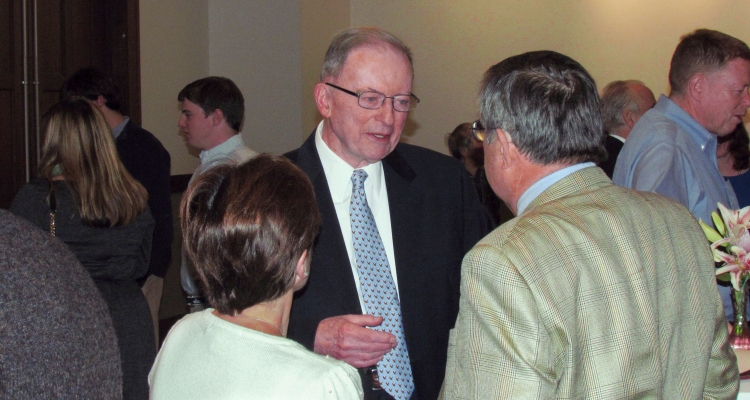
By
They don’t make them like Frank McLaughlin anymore.
The associate professor of economics, who will retire at the end of this semester after 52 years on the faculty, is a legendary classroom teacher, able to weave stories from his own life and times into his lectures on labor economics and the history of economic thought.
A lifelong Bostonian, McLaughlin bridges a Boston College era rooted in its place as a college for working-class men from the city to its prominence today as one of the nation’s leading research universities.
A child of the Great Depression, he knew the frosty edge of washing up in a coldwater flat. As a kid, he sold the seven daily newspapers once printed in the city, hawking them from a South End curb, peeling one after another from his stack one day in 1942 after the Cocoanut Grove nightclub fire killed 492 people.
At age 14, with Americans off fighting in World War II, he passed for 16 and took a job loading mailbags for the US Postal Service from 3:30-11:30 p.m.
“I was a war service temporary, indefinite employee,” said McLaughlin, who grew up in a family of eight that lived in Boston’s Roxbury neighborhood.
The Post Office shifts that helped his family make ends meet took a toll academically and McLaughlin was “asked to leave” the city’s prestigious Boston Latin School. But he settled in at Roxbury Memorial High School, where he played football and earned his diploma after five years.
McLaughlin was working as a draftsman in a Boston engineering firm when a friend encouraged him to take the entrance exam for BC’s former Intown School – the precursor to the Woods College of Advancing Studies. He enrolled two weeks later, taking night classes on Newbury Street.
What with working full time and being called to active duty during the Korean War, McLaughlin completed his bachelor’s degree in seven years. But along the way, courses in collective bargaining and social ethics taught by Fr. Thomas Shortell, SJ, convinced him to pursue a graduate degree in economics.
“I got the idea that I could build a better social order, but from Fr. Shortell I understood that I needed a technical competence in a subject like economics,” said McLaughlin. “[Fr. Shortell] was an awfully pro-union guy, but I learned a lot in those classes.”
McLaughlin did his master’s degree at BC at night as well, now supporting a growing family. On the recommendation of Fr. Robert McEwan, SJ, then chair of the Economics Department, he ventured across the Charles River to take up doctoral studies at MIT.
His dissertation on Boston’s port workers connected figures as disparate as MIT’s future Nobel laureate Robert Solow, a member of his review panel, and John “Red” Moran, the president of the International Longshoremen’s Association, who taught McLaughlin the realities of labor economics on the waterfront.
Fr. McEwan brought him back to BC in 1961 as part of the college’s nascent plans to grow into a doctoral-granting research university.
“Frank was a perfect candidate with his PhD from MIT, which was one of the best at that time, and his Boston roots,” said Associate Professor of Economics Harold Petersen, who joined BC in 1960. “And Frank wanted to be here.”
The milestones in his distinguished career include a Ford Foundation-funded study of urban renewal, a large-scale evaluation of federal manpower programs and tireless support of labor economics colleagues at area universities. But it is as a teacher that McLaughlin made his mark, educating an estimated 13,000 students.
“It’s my firm belief that storytelling is part of effective teaching,” said Petersen. “Students remember the stories they’ve heard and that helps teachers make their points. There is no better storyteller than Frank.”
Petersen said his longtime colleague has offered a much-valued perspective on both tradition and change, from a time when a “Boston College man” was most likely a man of the city itself.
“He does fit the profile of ‘Mr. Boston College,’” said Petersen. “At the same time, he bridges from where we came to where we are. He is a bridge to the modern world we live in and the national university we’ve become.”
McLaughlin and his wife Clare, married 64 years, raised 11 children, nine of whom graduated from BC. They went on to become police officers, entrepreneurs, social service workers, college administrators and federal officials. Currently, five of his grandchildren attend the University.
McLaughlin said it’s hard to sum up his 66 years at BC as both a student and professor.
“I’ve been lucky,” he said. “Lucky to be at BC and to be in this department. The amazing thing is that they’ve paid me to talk.”



